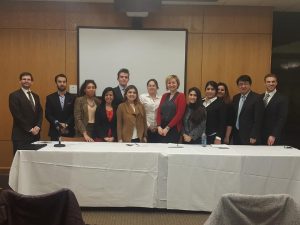The Center for Peace and Conflict Studies at Seton Hall University held a two-day conference on April 4-5 called “All Conflict is Local: Personal Experience, Reflection, and Conflict Resolution.” This conference was a unique opportunity for students studying conflict and post-conflict reconstruction to present their research to the Seton Hall community.
The conference w as organized by Dr. Zheng Wang, director of the Center for Peace and Conflict Studies, a specialist in global negotiation and conflict management, and an expert on the Asia-Pacific region.
as organized by Dr. Zheng Wang, director of the Center for Peace and Conflict Studies, a specialist in global negotiation and conflict management, and an expert on the Asia-Pacific region.
Dr. Wang was inspired by the Global Conflict Resolution and Peacebuilding course he is teaching this semester, and stressed to the students, “This is your conference.” He emphasized that the conflict is real for many people and there is a value in stories of conflict of those who experienced it.
The first day of presentations began with opening remarks by Dean Andrea Bartoli, who commended Dr. Wang for the creativity of the conference. Four panelists presented their work on the localized conflicts occurring in all parts of Africa. “Conversation is dangerous,” stated Dean Bartoli, “but injustices must be discussed for the sake of the victims to conflict, and for the betterment of society.”
Dosso Kassimou, a Seton Hall alumnus, spoke on the ethnic and s
ocial tensions between groups in Newark and the importance of culture and historical sensitivity. Kassimou claimed that the underlying motivation for a peace process was that “everyone wants to have a good life and sense of belonging, and it is this common want that will bring people together.”
Aboubacar Diaby, a crowd favorite for his vivid and energetic delivery, spoke on the ethnic and religious conflict in the Central African Republic. Diaby’s emphasis was on “conflict as part of the human being and understanding the causes of conflicts as key for preventing their reemergence.
Following the presentations, various professors gave their feedback. One of the main points from all of the presentations was the African concept of “Ubuntu,” an ancient African idea of ‘showing humanity to others.’ Panelists and Professors alike commented that this common sense of humanity has been lost by contemporary Africa, and most of the world for that matter, and that Ubuntu must be restored.
The second day was much less regionalized, with five groups presenting on conflicts from all over the world. Tabish Forugh, a Fulbright graduate scholar, spoke on Afghanistan, where he comes from. He made reference to a famous chess player, stating that “finding solution for conflict is a form of mental torture, however it is a torture we must endure.” Professors Borislava Manojlovic and Sara Moller were invited on stage afterwards to comment on the presentations.
The last two presentations were group panels on Cyprus and the Basque peace process. The Cyprus group included students who participated in the study abroad trip during spring break, and they discussed missing persons and abandoned areas. One student recounted the story of a woman who had lost her husband in the conflict, “she made the same dinner for forty years, wondering if her love would ever come back to her.” Through the use of forensic research her husband’s remains were identified, and after forty years, she made peace with her loss.
The members of the Basque Research Team discussed the localized effects of the conflict, a comparative analysis with the Colombian terrorist group FARC, and how the Basque region deals with the Syrian refugee crisis.
Following the presentations, closing words were delivered by Senior Associate Dean Courtney Smith and Dr. Wang, both of whom expressed interest to make the conference an annual event for the benefit of the students.
While originally planned to be held in the Diplomacy Room, the conference had to be moved to the Chancellor’s Suite in the University Center due to increased demand.
